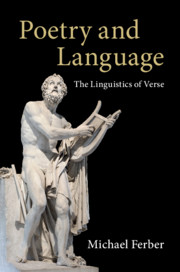Book contents
- Poetry and Language
- Poetry and Language
- Copyright page
- Dedication
- Contents
- Illustrations
- Acknowledgments
- Chapter One Introduction
- Chapter Two Meter and the Syllable
- Chapter Three Rhyme
- Chapter Four Onomatopoeia and Sound Symbolism
- Chapter Five Unusual Word Order and Other Syntactic Quirks in Poetry
- Chapter Six The Meaning of a Poem
- Chapter Seven Metaphor
- Chapter Eight Translating Poetry
- Appendix Quantity and Pitch in Greek Verse
- Works Cited
- Index
Chapter Six - The Meaning of a Poem
Published online by Cambridge University Press: 02 October 2019
- Poetry and Language
- Poetry and Language
- Copyright page
- Dedication
- Contents
- Illustrations
- Acknowledgments
- Chapter One Introduction
- Chapter Two Meter and the Syllable
- Chapter Three Rhyme
- Chapter Four Onomatopoeia and Sound Symbolism
- Chapter Five Unusual Word Order and Other Syntactic Quirks in Poetry
- Chapter Six The Meaning of a Poem
- Chapter Seven Metaphor
- Chapter Eight Translating Poetry
- Appendix Quantity and Pitch in Greek Verse
- Works Cited
- Index
Summary
A poem means what the poet meant. That is the briefest way to state a widely held belief, taken as indisputable common sense by most ordinary readers and many literary critics. We understand and interpret a poem by inferring the intention of the poet who wrote it. That is how we understand ordinary speech-acts – people communicate what is in their minds to other people – and that is how we understand the speech-act we call a poem. Without the anchor of the poet’s intention, we go adrift, subject to any passing wind or wave, and there is no other anchor. It is true that we often have no external evidence of a poet’s purposes. We know little of any consequence about William Shakespeare, for example – so little that many otherwise intelligent scholars have convinced themselves that somebody else wrote his works. About Homer, we know nothing at all: he may not even have existed, being only a name attached to a long tradition of oral bards. In these cases, the anchor is merely notional, and its chain weak, but when we meet difficult passages, we nonetheless do our best to imagine what Shakespeare and “Homer” must have intended in order to rule out our own subjective associations and limit our susceptibility to the currents and tides of voguish literary theory.
- Type
- Chapter
- Information
- Poetry and LanguageThe Linguistics of Verse, pp. 142 - 194Publisher: Cambridge University PressPrint publication year: 2019
- 1
- Cited by

